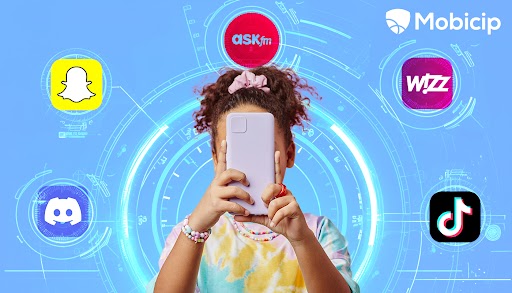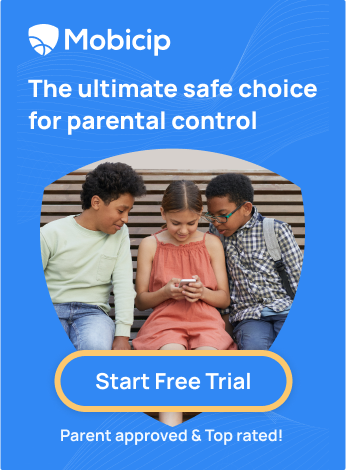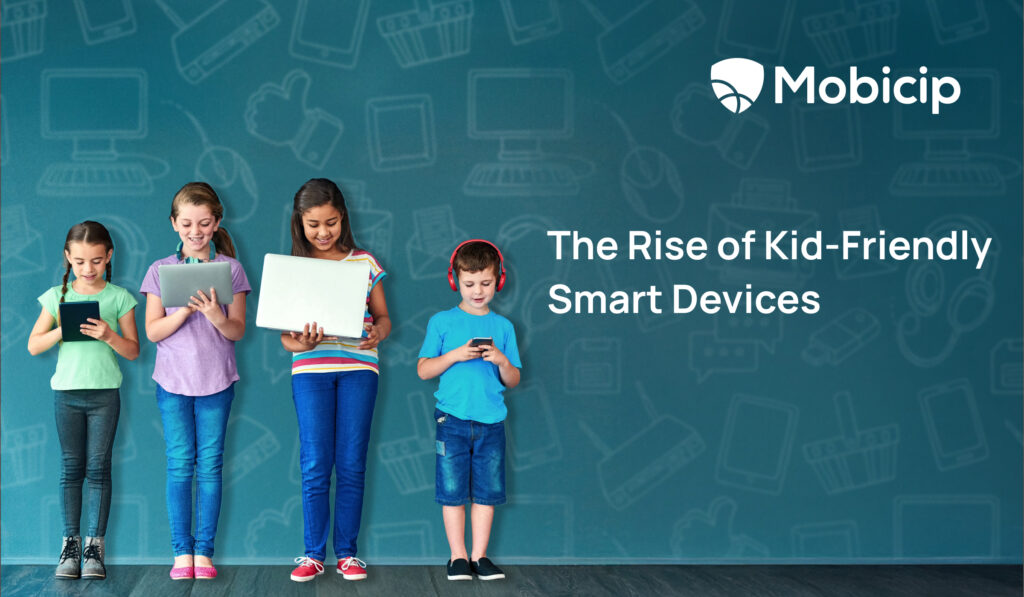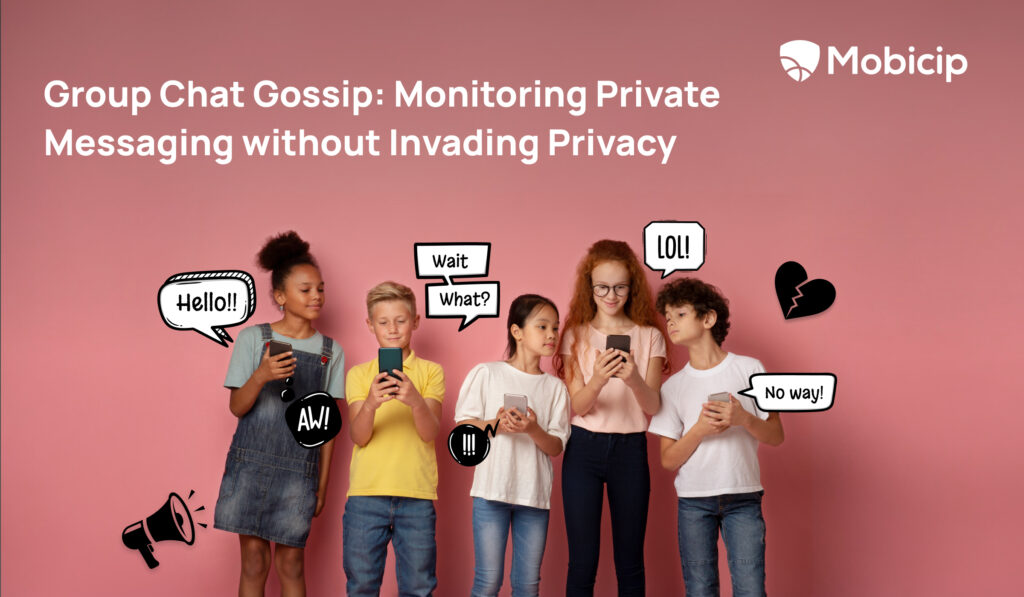5 Under-the-Radar Chat Apps That Could Be on Your Kid’s Phone
Messaging has revolutionized how young people interact. It’s no wonder then that 88% of Gen Zs message daily. Gen Z, the digital natives, seamlessly navigate a complex world of chat apps, using them as a primary mode of communication. With an innate tech-savvy approach, they often keep things hidden by creating private accounts, disappearing messages, and using coded language.
What can go wrong? Unmonitored chat apps can become breeding grounds for cyberbullying, fostering low self-esteem and anxiety and even influencing inappropriate behavior. In this blog, we’re unraveling the mystery around five sneaky chat apps that might be quietly nestled on your kid’s phone. Meet ASKfm, Snapchat, TikTok, Discord, and Wizz. They might seem harmless, but hang tight as we unveil their not-so-innocent secrets.

ASKfm
ASKfm is a social media platform and mobile application designed for users to pose and respond to inquiries from other users either anonymously or publicly. With over 300 million registrations and 100 million app downloads, it is a hit among youngsters as a means to engage with friends and complete strangers by exchanging questions and answers. Along with an interactive Q&A feature, the platform includes user profiles. It allows users to reveal their details, create photo polls, and connect with those with shared interests.
Now, here’s the tricky part, especially for kids. ASKfm can be not-so-good for them. Cyberbullying is very prevalent in ASKfm, as anonymous people can send mean messages or ask rude questions. And it can hurt a lot! Imagine someone saying something horrible about you, but you don’t even know who it is.
Hateful comments, vulgar questions, and inappropriate content can make kids feel bad about themselves. They might think they’re not good enough and have low self-esteem. It can make kids sad or worried. And that’s not all – some kids might feel so depressed and anxious that they may end up doing something really serious, like suicide. Such was the case for Hannah Smith, a 14-year-old girl from Leicestershire, England, who had killed herself. Her dad believed that the cyberbullying responses she received on ASKfm was the cause of her passing away..
Snapchat
Snapchat, a widely used messaging app, is quite the trend among teenagers. It lets you exchange photos, texts, videos, and calls. What’s so special? Well, your messages disappear after a short time, like 1 to 10 seconds. Users can now opt to have friends view them for as long as they’d like. But here’s the catch – viewers can still take screenshots.
Snapchat has 406 million daily users and 750 million monthly users. It’s the fifth most downloaded social media app worldwide. In the United States, it’s the third most downloaded. It’s not all sunshine and rainbows with Snapchat. There’s explicit language, sexual content, violence, and ads lurking around. Plus, those fancy filters might create unrealistic beauty standards among kids.
Snapchat can be risky for kids since it lets them connect with strangers, making it easier for online predators to create fake profiles and groom children for inappropriate conversations or even face-to-face meetings. The app’s features, like location sharing and Stories, may lead kids to share too much personal info, putting them at risk of stalking. There have been cases where shared content, like photos or videos, was used to blackmail and exploit minors. The temporary nature of Snapchat content might give teens a false sense of security with sexting, but screenshots can still be taken, leading to potential misuse. Plus, it’s tough for parents to keep an eye on what their kids are up to on the app.
TikTok
TikTok is a video app where people make short videos. You can dance, sing, or just be silly. It’s famous for creative and funny stuff, lip-synching, and weird challenges. You can swipe through videos and keep watching at length. Lots of teens use it to share moments from their lives. You can follow your favorite creators, and they might follow you back.
TikTok has become a global craze, especially among younger folks. According to data from Business Insider, kids between 11 and 17 spend nearly two hours per day on TikTok, making it the social media platform they use most. In the U.S, kids spend an average of 113 minutes daily on TikTok, slightly higher than the global average of 107 minutes.
The use of TikTok brings about serious concerns for kids. They might spend excessive time watching videos, almost like they can’t stop. Also, there’s a risk of them attempting to imitate someone they’ve seen, leading to unsafe situations or injuries. Some videos may even promote behaviors that aren’t appropriate for their age, influencing them negatively. They might also get exposed to sexual or violent content posted to the public feed. Further, the platform’s openness means that anyone, even strangers, can watch their videos, react and reach out to them.
Discord
Discord is a chatting app your kids might be into. It’s where people with similar interests can share and communicate. It’s popular for gaming and hanging out with friends. You can send pictures, videos, and GIFs in text or direct messages (voice channels are just sound). Also, you can video chat and share screens in private messages. Your child can create or join servers, which are like exclusive hangout spots.
Discord has become pretty popular with an estimated 563 million users in 2023. The United States is leading in downloads, grabbing a 25% share. Popular games like Blox Fruits from Roblox, Valorant, and Genshin Impact have big Discord servers worldwide.
Discord has a whopping 150 million people actively using it each month. Discord is for users 13 and up, or whatever the digital consent age is in their country if it’s older than 13. But, many servers want you to be 18 or older because there can be explicit content, which is not suitable for minors. Yet, this check isn’t foolproof and can be sidestepped.
Now, something to watch out for: 45% of Discord incident reports involve harassment and spam. Using Discord might not be the best for kids. Discord can be risky for kids as it exposes them to mature and explicit content like profanity, hate speech, gore, and NSFW (not safe for work) material. Kids might come across inappropriate content that can negatively impact their mental well-being. Spending excessive time on Discord can lead to addiction, affecting their daily activities like school and play. It can be a platform for cyberbullying and harassment too. In some cases, exposure to extremist views or communities on Discord can contribute to radicalization. There’s also a risk of encountering phishing attempts, where users might be tricked into revealing personal information or falling for scams.
Wizz App
Imagine a dating app for kids – sounds unsafe, right? Well, that’s pretty much what the Wizz app is, even though it claims to be just for making friends online. You can swipe through profiles of people worldwide and chat. Wizz is a social networking app letting users connect globally, chat live, and share images and videos. It’s a meeting place for people with similar interests in gaming, sports, music, films, and more.
Available on the App Store, where it’s advertised as a “safe space,” and Google Play, Wizz has a swiping feature like adult dating apps and is sometimes called ‘teen Tinder.’ Users can check out profiles of strangers and swipe to dismiss or start a conversation.
Wizz has grown from zero to 16 million users in just three years, most recently reaching 3.8 million daily active users, according to data.ai. It quickly gained traction as a social discovery app for teens aged 13 to 25.
Parents, be aware of the potential dangers lurking on the Wizz app. Age verification may have loopholes, allowing kids as young as 12 to create profiles. The system, relying on a selfie and birthdate, can be fooled by younger kids using someone else’s photo and a fake birthdate.
Stranger danger is a major concern, as Wizz lacks a robust age verification process. Scamming, stalking, blackmail, phishing, catfishing, grooming, and sexual predation are all risks. The app, though marketed as a friend-finder, is often seen as a dating platform, exposing users to explicit content and the potential for sexting. Inappropriate language may seep into your child’s vocabulary through Wizz, especially for younger users.
Use Mobicip to protect your Kids from the under-the-radar chat apps
-
Mobicip blocks all apps rated 17+ by default for kids, reducing the likelihood of them stumbling across inappropriate apps. While most App Blockers only allow you to block installed apps, Mobicip goes one step further by allowing you to block apps in advance, even before they are downloaded by your kids!
-
Mobicip shows you all the apps installed on your child’s device at any given point. Once you block an app, it cannot be used until you allow it again.
-
App Blocker Social media and gaming apps distract children from being productive; even leading to screen addiction in some cases. Mobicip restricts potentially addictive apps while ensuring access to fun, and educational apps.
-
Receive alerts as soon as your child installs an app or block all new app installs by default.
-
Set screen time allowance to limit time spent on apps like social media and videos.
FAQs
How do I know what chat apps my kid is using?
Communication is the key to understanding what your kid is up to online. To know what chat apps your kid is using, just talk to them. Ask about their favorite apps and who they talk to. Check their phone or tablet for icons of messaging apps. Look through the app store together. Keep an eye on notifications. Also, spend time using the device together, and they might show you what apps they like. It’s important to be curious and open, so they feel comfortable sharing with you. You can also use Mobicip to be aware of the apps installed on their phones.
How can I talk to my kid about chat apps and online safety?(H3)
To talk to your kid about chat apps and online safety, start a simple conversation. Ask about their favorite apps and who they talk to. Share your concerns in a calm way, focusing on safety. Explain the importance of not sharing personal info and being kind online. Use real-life examples or stories to make it relatable. Set clear rules about acceptable behavior. Encourage them to come to you if anything feels wrong. Keep the talk open and friendly, so they feel comfortable sharing their online experiences. Regularly check in on their online activities and let them know you’re there to help if needed.
How can I block or delete chat apps from my kid’s phone?
To block or delete chat apps from your kid’s phone, go to the settings. Look for “Apps” or “Applications.” Find the app you want to block or delete. Select it and choose “Uninstall” or “Disable” to remove it. You can also use parental controls like Mobicip on the device to restrict app access. Discuss the decision with your kid, explaining the reasons behind it. Make sure they understand and feel involved in the process. Regularly check and update settings to keep their online experience safe.




